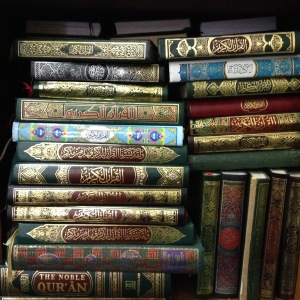The Black Lake, Hella Haasse, 1948
- Indonesia, #7
- paperback (received as a gift)
- Read May 2017
- Rating: 4/5
- Recommended for: reformed spoiled brats
I’m skipping over Sitti Nurbaya, which is next on the Indonesia list, because I’ve been stuck on it for the past two months and just not getting anywhere. There’s a lot to talk about with that book, but I’m boring myself with what I have to say and I don’t want to bore all of you too. So hopefully I’ll come back to it at some point, but for now I’m moving on to The Black Lake.
Here’s the paragraph I wrote right after I finished the book: Beautiful, evocative, but somehow slight. Part of this is due to its just-over-100-page length, which makes it the work of an hour or two to read. Part of it, though, is due to the incomplete characterization of the two main characters. I have no doubt this is intentional. The Dutch narrator, who relates his memories of the Indonesian best friend of his boyhood, Oeroeg, could stand in for all colonists in his lack of self-awareness, his insouciance, his inability to recognize or comprehend the differences in social status between the two of them. Oeroeg, burning with an anger that the narrator fails to recognize, could represent all Indonesians, or indeed all colonized people. On this level, as a parable, the story works superbly. The course of events, as the narrator bumbles through his friendship, smashing Oeroeg’s life apart and taking no responsibility for the events or Oeroeg’s resulting anger and alienation, feels inevitable; the only person surprised is the narrator himself. And yet something is sacrificed on the superficial level, the most straightforward level of the story–by making her tale universal, Haasse also makes it somewhat vague.
But two weeks later I wrote: the book has grown in my memory and I think that I undersold it there. It’s a slow burn. It has stayed in my mind, and the more I think about it the better it seems. It’s beautifully understated; Haasse makes us work a little for our understanding of her themes, even to the point of wondering whether what I got from the book is really what she meant. I think it is. I think this short novel is crafted with such subtle genius that Haasse guides us smoothly to her intended conclusions while allowing us to believe we’ve come to them on our own.

As I write this, nearly a year later, I stand by that second paragraph. It reminds me of Kazuo Ishiguro’s When We Were Orphans, another book in which a white man, having grown up under a now-defunct colonial regime, seeks out a childhood friend who now fights for an enemy army. Both books are similarly dream-like and I found them initially unsatisfying, but now I find myself still thinking about both of them when I’ve forgotten other books that made a more favorable initial impression (there is some interesting stuff to do with race and homeland here; Ishiguro, born in Japan and raised in England, writes about the relationship between an Englishman and his Japanese friend; Haasse, a Dutch woman who was born and raised in Indonesia, writing about the relationship between a Dutchman and his Indonesian friend; pointing this conjunction out is as far as I want to explore it here, but someone else feel free to steal the idea for a term paper or something). The Black Lake has born up well in my memory, full of unforgettable images and uncomfortable truths. This is one that I’ll read again.

One thought on “The Black Lake”